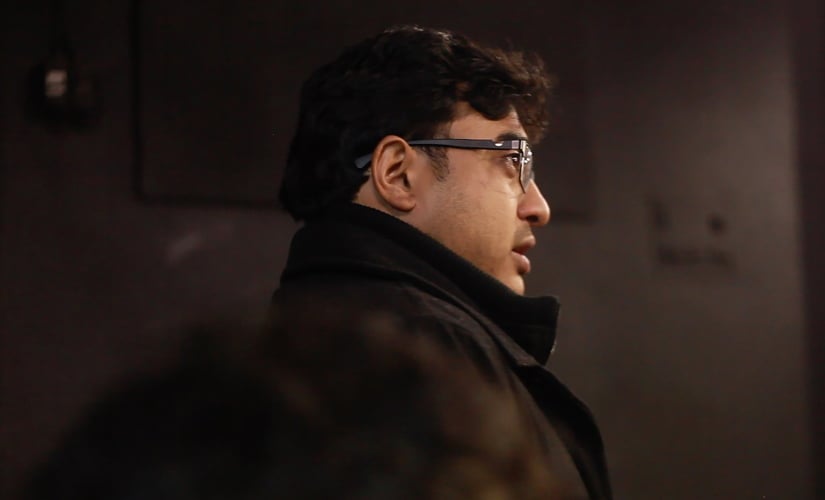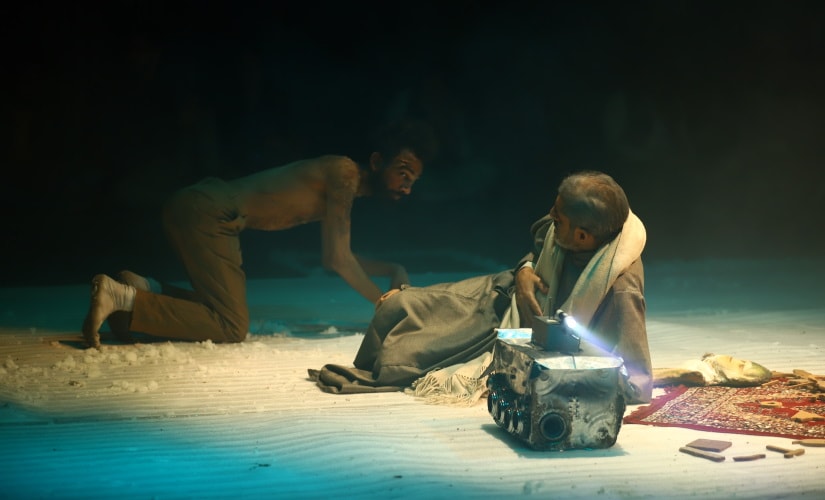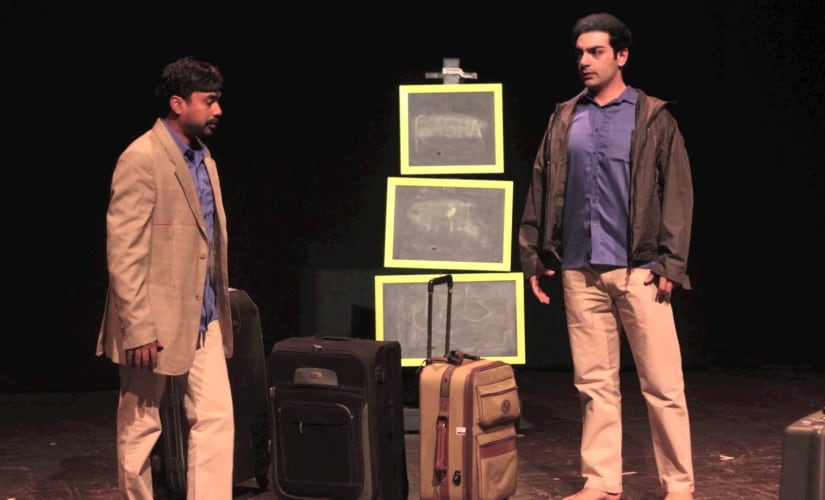Editor’s note: This is the second in a two-part interview with playwright-director Abhishek Majumdar. Majumdar’s production of Djinns of Eidgah by the Bread Theatre and Film Company of Cambridge is currently being staged at the Edinburgh Fringe until 18 August. Majumdar spoke with critic Trisha Gupta about theatrical form and content, the politics of language in India, and his many interests beyond the stage. Read part 1 of the interview here. *** Is there one idea that each play starts with? The theatre is all about confluence. For an idea to become a play, seemingly different things must stick together. Like in Kaumudi, you have a father and son, who mirror Ekalavya and Abhimanyu. The father is going blind, and there is a theatre inside a theatre. These could be four different plays. But I am fond of density, that’s my thing. Though that is also one of the criticisms of my plays. [caption id=“attachment_7179181” align=“alignnone” width=“825”]  Abhishek Majumdar[/caption] Density leads us nicely to my next question. You work in Hindi, in a moment when there’s increasing criticism of the elitism of English. But you also work in theatre. Do you ever think about reaching out to larger audiences? I have a lot of confidence in the theatre. If a play is worth anything, it will outlive at least one generation. And over time, plays have large audiences with a much deeper level of engagement. So I think the idea of audience is a more complex matrix than just the number of people right now — it’s also about density, how many, where.
The paradox of our time is that in this political moment, you want to make work because it feels urgent. Which is of course necessary, in the face of what is going on. But at the same time there are so many philosophical problems in the humanities and sciences which are completely worth looking at. Is an entire generation of artists only going to look at Hindutva? Maybe it has to, but we also need deviations.
Having said that, I make theatre because I like every dimension of it. I love the craft of it, the art of it, the coming together of people to do it it, the teams that we build, having that audience live, reaching out, going to small towns, going to big cities. While closing Muktidham, we had a moment where Sandeep Shikhar’s daughter Sanchi, who I have seen being being born, was sharing a room with Ram Kissar, who does our make-up, who has worked with BV Karanth since he was 20. This is possible in the theatre, because of the nature of its form. It’s not like everybody has to be trained in one dance form. It is rough, rugged, it is mixed, it reflects the streets of your town. The street has an old man and a young woman, so the green room must have that. And that is for me the reaching out of the theatre. But are you often accosted by the question of whether you want to direct a film? Or turn your plays into films? Suman Mukhopadhay, I call him Lal Da, has won a major award to make a film out of Djinns of Eidgah. I am not a big fan of cinema, though I will direct a film at some point. What I am interested in is directing concerts. I grew up travelling a lot with Indian Ocean, and that gave me the idea that there is a dramaturgy to concerts. A couple of bands have asked me. Susmit [Sen] also asked, but I’ve looked up to him for so many years, I can’t direct him! He will have no problem, but I will have a problem. But now I’m thinking of a concert of sound designers, as opposed to musicians. [caption id=“attachment_7179121” align=“alignnone” width=“825”]  A still from Majumdar’s Djinns of Eidgah[/caption] Would you write the music for such a concert yourself? Some of it. Right now I compose mostly for plays. I took music for granted, because I grew up with Hindustani music classes in my house, and my mother playing the piano every evening and singing Rabindrasangeet. I can use Bengali notation, Swaralipi, which is often used on the piano. How do you see the state of theatre in India? Are there exciting things happening? I think art and science need a lot more government support. These things are important for human beings to exist, and they can’t be market driven. This emphasis on the commercial, treating ticket sales as the parameter of existence, as if without it you’re not speaking to the people: that’s a cop-out for not thinking deeply about what the human race needs. Individually a lot of exciting stuff is happening, from solo performances to technological things. What in Europe is called ‘site-specific theatre’ has been happening in India in Prahallada Naatak for a thousand years. Going to the proscenium is a new thing for us. But now, the urban Indian is coming back from the West with the idea that only what’s being made there is work. As a person who teaches in a university, I straddle some of these worlds. For the last five years, I teach playwriting at the NYU campus in Abu Dhabi for a semester every year. I have never had two students in the same class from the same country. How many students in a class? Eight to eleven, from India, but also Jordan, Palestine, Latin America, the African countries. And the challenge is that they all need to find specific solutions to their postcolonial situations. We are much closer in the arts and sciences to Bangladesh or Algeria than to New York or London. But we have started thinking of the world as a ladder. That’s not helpful at all. Yes, there are great things to learn from a cultural exchange of that sort. But just as the first world person is always operating out of a particular context, it is also important for us to operate out of our context. I was telling a student the other day that if you want to know where you are making art, you have to ask yourself two questions. One, if about 10 to 12 percent of a country’s GDP is spent on arts, then public support for the arts in say, Germany, is about 300 percent that of India. Second, you need to be conscious of historical imperative. It is lowest on Broadway, in New York, which is farthest from colonisation. You can make anything, it basically has to sell tickets. And it is highest in the Gaza strip, because right now, as you’re making that play, you are colonised. [caption id=“attachment_7179221” align=“alignnone” width=“825”]  A still from Majumdar’s Gasha[/caption] Why is your idea of historical imperative limited to the experience of colonisation? Yes, I’m being simplistic, in order to find an axis that works globally. There are other axes not directly related to colonisation. Within India, how many plays do we see with lower caste women as characters? Nothing, compared to the many with upper caste men. You mentioned that developing a Dalit dramaturgy is one of the things you’re excited about. Yes. After we moved on from Indian Ensemble, Sandeep Shikhar and I started a new theatre company along with Vivek Madan. It’s called the Bhasha Centre, and our main focus are at the moment is to work with Dalit texts and Dalit writers, from Daya Pawar and Limhale on Dalit aesthetics to published Dalit autobiographies and the work of lok shahirs. It might not be a literature that already exists. We’re collaborating on a version of Kisaan that will open at Prithvi Theatre in March 2020. Iravati Karnik is writing it, drawing on Prithiviraj Kapoor’s original play Kisaan together with Daya Pawar’s Baluta. Any other ongoing projects you’d like to flag? There’s Tathagat, a street play we did in collaboration with Jan Natya Manch, which played in Mumbai from 9 to 14 August. There’s a version of Eidgah ke Jinnat with Jawahar Kala Kendra, Jaipur, with many Rajasthani actors. Djinns of Eidgah is also being staged at the Edinburgh Fringe Festival this month, by Ananya Mishra and the Bread Theatre Company, formed by a lot of non-white Cambridge University students. As someone who works in London and New York as well as in Bengaluru and Bangladesh, it is important to me to know how much time I work where. I am not making work in England in order to give up my work in India; that’s not going to happen. But last year we were touring in Uttar Pradesh and sleeping in trains, and just after that I spent a month in New York. And that is absolutely fine in the theatre. But as time gets limited, it becomes important to choose, to measure. I like that we have come back to the mathematics. Thank you, Abhishek. Read more of Trisha Gupta’s writing on her blog.


)
)
)
)
)
)
)
)
)



